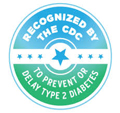Frequently Asked Questions:
With the right and timely changes in lifestyle, Prediabetes can be reversed. Here is how......

Q: What is the importance of diabetes prevention during this current COVID-19 Pandemic?
Answer: Age, sex, ethnicity, the presence of multiple conditions such as diabetes, hypertension and cardiovascular disease, obesity, and a pro-inflammatory and pro-coagulative state all probably contribute to the risk of worse outcomes of this COVID-19 infection.

Q: What is Prediabetes?
Answer: Prediabetes means your blood glucose (also called blood sugar) levels are higher than normal but not yet high enough for you to be considered as having diabetes. Almost everyone who develops type 2 diabetes develops prediabetes first. Approximately 84 million American adults (more than 1 out of 3) have prediabetes. Of those with prediabetes, 90% don’t know they have it.

Q: How does having prediabetes feel?
Answer: Diabetes develops very gradually, so when you're in the prediabetes stage – you can stay in this stage for a number of years without feeling it, that means you may not have any symptoms at all. However, if you notice that you're hungrier than normal, losing weight despite eating more and feeling tired more than usual it is better to get a fasting blood glucose or A1C test done in a doctor’s office/ lab to confirm if you have prediabetes.

Q: Will I get Diabetes if I have prediabetes?
Answer: Getting diagnosed with prediabetes is a serious wake-up call, but it doesn't have to mean you will definitely get diabetes. There is still time to turn things around. It’s an opportunity to initiate lifestyle changes or treatments, and potentially retard progression to diabetes or even prevent diabetes.

Q: What is Diabetes Prevention Program all about?
Answer: The National Diabetes Prevention Program (National DPP) is a partnership of public and private organizations working to prevent or delay type 2 diabetes Partners such as our clinic (Midha Medical Clinic) make it easier for people at risk for type 2 diabetes to participate in this effective and CDC recognized evidence-based lifestyle change program to reduce their risk of developing diabetes.

Q: Why should I join National DPP to prevent diabetes?
Answer: The National DPP lifestyle change program is founded on the science of the Diabetes Prevention Program research study (original trial in 2002), and several translation studies that followed, which showed that making modest behavior changes helped people with prediabetes lose 5% to 7% of their body weight and reduce their risk of developing type 2 diabetes by 58% (71% for people over 60 years old).